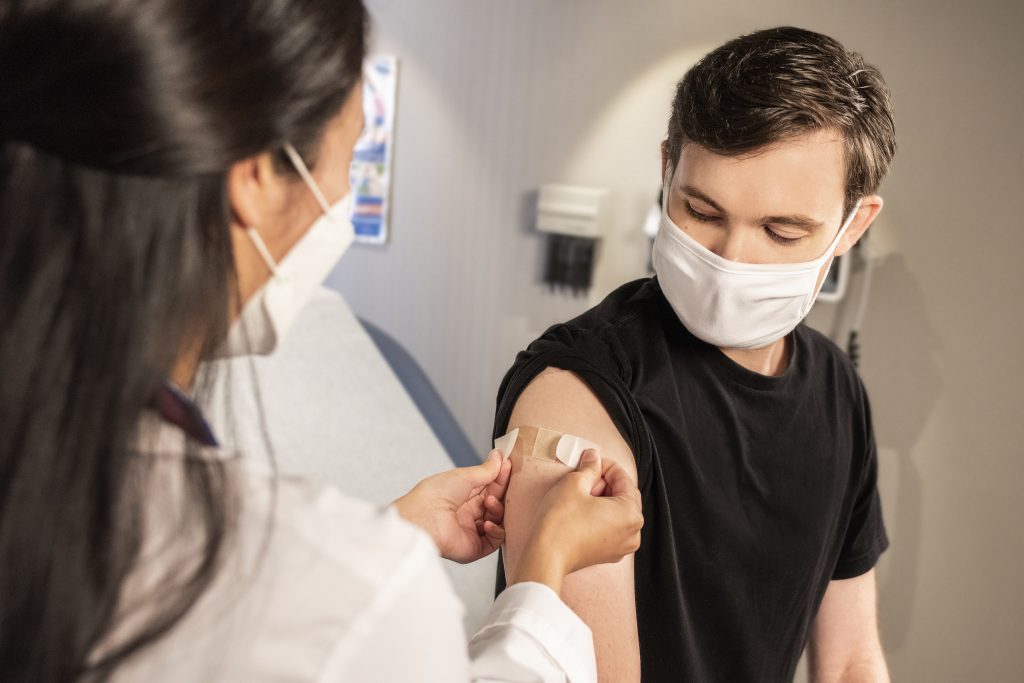- Survey of unvaccinated Americans finds that about two-thirds would be motivated to get the COVID-19 vaccine or consider it if their employer imposed a health care surcharge
- Other polls show that unvaccinated workers are much less likely to get a vaccine to comply with a company mandate
- The data comes as the White House works to issue a COVID-19 vaccine mandate for businesses employing at least 100 people
Summary by Dirk Langeveld
As the White House moves forward with a proposed COVID-19 vaccine mandate for businesses with 100 or more employees, surveys show that unvaccinated employees rarely say they would get a dose if this rule was put into place. However, one poll shows that about two-thirds of workers would get the shot or consider it if their employer imposed health care surcharges on unvaccinated workers.
In a survey of 1,000 unvaccinated Americans by the health care exchange Affordable Health Insurance, 43 percent said they would be motivated to get the COVID-19 vaccine if their employer imposed a surcharge on unvaccinated workers. Twenty-five percent said they might be motivated to get the vaccine, while 31 percent said they would not get vaccinated because of a surcharge.
The majority of respondents, 63 percent, said they would consider getting vaccinated to avoid a surcharge of $100 or less. Seventeen percent said a surcharge of $200 or more would be necessary in order for them to consider getting the shot.
The survey also found that respondents with higher incomes were more likely than those with lower incomes to be motivated by a surcharge. In addition, Democratic respondents were more likely than Republican ones to say they would consider getting vaccinated due to an employer surcharge.
Other penalties also had the potential to urge employees to get a COVID-19 vaccine. Fifty-six percent said they would consider getting vaccinated if their employer cut paid time off for unvaccinated workers who test positive for the virus. Fifty-three percent said a mask mandate for unvaccinated workers would make them consider getting the shot.
Fifty-five percent of respondents said they’ve felt pressure or judgement from an employer because they had not gotten vaccinated. Fifty-four percent said they’ve had the same response from co-workers.
From carrot to stick
When COVID-19 vaccines became widely available earlier this year, following an initial rollout aimed at certain populations such as health care workers and older residents, companies were largely reluctant to mandate that employees get vaccinated. Businesses, along with state governments, preferred to incentivize getting the dose through discounts, freebies, and other perks available to those who could show proof of vaccination.
As vaccinations have plateaued and a new surge of COVID-19 infections has been tied to faltering economic growth, several larger companies have changed their strategies. These have included stronger requirements for in-person work, such as showing proof of vaccination or submitting to regular testing if they get an exemption for medical or religious reasons. Such mandates are expected to become more common following the Food and Drug Administration’s full approval of the COVID-19 vaccine.
Airlines have taken a particularly stringent approach, establishing measures in line with the Affordable Health Care survey. Delta Air Lines established a $200 monthly surcharge for unvaccinated employees, while American Airlines and Alaska Airlines cut paid time off for unvaccinated workers who contract the virus. Some airlines are also seeking to revive incentives, such as $200 bonuses for vaccinated employees.
Earlier this month, President Joe Biden announced that he is asking the Occupational Safety and Health Administration to establish an emergency temporary standard on COVID-19 vaccinations that will apply to companies with 100 or more employees. This proposed rule will require employees to get vaccinated or submit to weekly testing if they receive an exemption.
Pushback on vaccine mandate
Gallup, analyzing its own polls as well as several others, found that surveys consistently show majority support for a vaccine mandate, but only by a slim margin. Between 53 percent and 60 percent supported the idea, with between 34 percent and 46 percent opposed. A Connecticut Business & Industry Association survey found similar results among Connecticut businesses in a survey issued before the proposed mandate was announced.
Gallup suggested that the Biden administration faces challenges in convincing those opposed to a mandate to accept one, since the surveys show a clear partisan split. Only a small share of Democrats are opposed to vaccine mandates, while opposition is more concentrated among Republicans and right-leaning independents.
Some surveys suggest that employer mandates will have only a limited effect in persuading unvaccinated workers to get a shot. A Washington Post and ABC News poll of unvaccinated workers, issued before Biden’s proposal but after the FDA approval of the Pfizer dose, found that only 16 percent of respondents would get the shot if their employer required it while 42 percent would quit.
The survey further found that 35 percent would seek an exemption. Among this group, 18 percent said they would get vaccinated if they were denied an exemption while 72 percent said they would quit.
A similar survey issued by CNBC found that 87 percent of unvaccinated workers would not get a COVID-19 vaccine if required by their employer, while just 4 percent would. One-third of respondents said their reticence was motivated by a distrust of the federal government, while another third said they were concerned about potential side effects.
The mandate would not affect the nation’s smallest businesses, but the proposal has also received some criticism from small business groups. The conservative small business advocacy group Job Creators Network announced that it plans to sue the Biden administration over the proposed mandate, while the National Federation of Independent Business criticized the effort as federal overreach. The National Small Business Association offered neither support nor criticism, instead urging the administration to proceed cautiously and consider the efficacy of the mandate as well as any potential negative effects.








